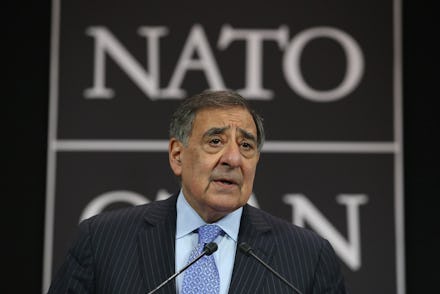Military Budget Cuts Are Undermining Our Own Security

With the federal government open again and the threat of the U.S. defaulting on its debt gone (at least for a few months), now is a good time to take a look at where America’s national priorities lie. If the American people and their elected leaders wait until the next budget showdown to try and resolve the country’s fiscal debates, there could very well be another round of ill-conceived sequestration, or another close call with default that hurts the American economy, or both. Panic is hardly a good context in which to make wise financial decisions, especially when those decisions concern national and international security.
As much as the closing of America's national parks and the loss of $24 billion hurt the U.S., somewhat less noticed has been the damage done by the government shutdown (and the sequestration policies already in place) to American security interests. In a recent interview, former Defense Secretary Leon Panetta argued that sequestration has been hurting “our readiness and our ability to respond to a crisis in [the Middle East]”.
In August, the deputy defense secretary and the vice chairman of the joint chiefs of staff described the effects Congress' budget battles have had on national security. They noted that less than half of the Air Force’s front-line fighter squadrons are considered combat-ready; the Navy has had to cancel scheduled ship deployments, including the deployment of an aircraft carrier strike group to the Middle East; and the Army has been forced to cancel “all Combat Training Center rotations for those brigade combat teams not slated to deploy to Afghanistan or to be part of the global response force.”
This last item is particularly worrying because, in the officials' words, “If we are called upon to defend South Korea, or to secure chemical weapons in Syria, the young men and women the commander in chief will need to send in harm's way will never have had the opportunity to work together as a part of large Army formation.”
Reasonable people can disagree about the pros and cons of particular changes to U.S. military spending and about what kind of missions the military should prepare to undertake, but when the military is deployed to a particular hotspot, it is in everyone’s interest for the personnel deployed to be prepared to successfully conclude their mission. Letting the preparedness of the world’s strongest security establishment wither is in no one’s interest.
It would be wonderful if more of the world’s developed democracies took up a greater share of the burden of international security. Indeed, the Obama administration’s “pivot” to the Asia-Pacific can, and should, act as an incentive to European countries to increase spending on their militaries so that they are not so dependent on American strength to ensure transatlantic security. Likewise, the combination of increased domestic oil production and increased use of clean energy by the U.S. military should reduce the need for the U.S. military to play such a strong role in protecting the flow of oil across the globe. Americans, weary of more than a decade of continuous war, are right to hope that other countries will play more prominent roles on the world stage.
But until this hope becomes a reality, the simple truth is that someone must undertake these tasks, and the U.S. is the country best positioned to do so. You never know where and when the next crisis may strike, and while no country should try to deploy its military everywhere, it is best for the world if the U.S. at least maintains the capability to respond to crises that merit its attention.